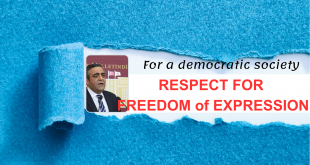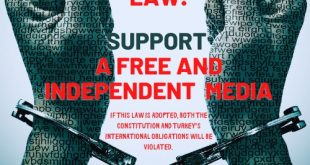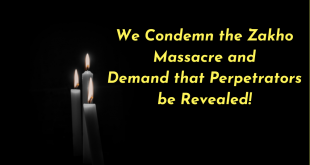Human rights organizations share the opinion that an independent and efficient Human Rights Organization will undertake a significant function in terms of protecting and putting into life human rights and freedoms, in addition to providing important contributions in the realization of basic rights and freedoms. For that reason, the initiatives towards creating an independent human rights organization by the public administration are monitored and contributions are provided. However, human rights organizations were ignored by the public administration in this process, and no consultation was carried out in the process of preparation of the law, initiatives and proposals towards establishing dialogue with them were ignored and the experience and actions they have were neglected. Except the first proposal which was prepared in 2004, all drafts that were prepared were almost hidden from human rights organizations. Thus, in the process of establishing an organization which will be in close relationships with civil society organizations including human rights organizations, the most important stakeholder in protecting and disseminating human rights and basic freedoms was ignored. The draft prepared by the government was referred to the Parliament on 28 January 2010. We would like to share with public our opinions and concerns related to the draft, which will be discussed in the Constitutional Commission of TBMM. The foundations of these ideals comprise of the results which we have derived from our experiences we had with Human Rights Department, Provincial and District Human Rights Boards and Human Rights Advisory Board, which were constituted at early 2000, as well as the United Nations Paris Principles which constitutes the source for the formation of Human Rights National Boards Independence of the Organization Independence of an organization that is in compliance with Paris principles should be considered from various viewpoints. These could be defined as “legal autonomy”, “operational autonomy”, “financial autonomy” and procedures related to “assignment and dismissing”. Although the draft provides legal autonomy with a law of incorporation, it fails to fully secure the independence of the organizations which will be established in terms of assignment and dismissing and in particular of operational and financial autonomy. Operational Independence: In the draft, the authority to make recommendation has been granted to the public organizations (Articles 4 (f), 6 (c )). However, it is clear that the authority to make recommendation does not make any sense on its own. The draft does not bring an explanation pertinent to the procedures on how these recommendations will be used with which mechanisms when any recommendation is received. In addition to that, the draft does not say anything on what sort of measures will be taken in case that the recommendations to be made by the Organization is ignored and no respond is given to the recommendations. Financial Independence There is a direct relationship between financial autonomy and functional autonomy. As it was described in the draft, the main source of income of the Organization is the aid it will receive from the general budget. The concept of aid is a vague one, and the draft does not include anything on where and how this aid will be given, and how its continuity will be. Independence Through Procedures Related to Assignment and Dismissal Any public organization could be free to the extent that individuals that constitute it are free. Therefore, the issues of by which organ the assignment will be made and how the election processes will process are very important. In the draft, it was foreseen that the assignment would be made by the Council of Ministers. In an assignment to be made by the Council of Ministers, the independence of an organization, task of which is to review and investigate the actions of the government, will be damaged. Besides, the draft does not include any regulation on using which processes and procedures the Council of Ministers will deal with the applications to be made to it. Authority to Dismiss, Privileges and Immunities The authority to dismiss is directly related to the independence of a national organization. The law should give details on the conditions under which a member could be dismissed in order not to make a sacrifice from independnece, and it should be made clear under whose authority the dismissal is. In the 10. Paragraph of Article 3 the Draft Law, which regulates the cessation of memberships, it is stated that “memberships of members against whom any ruling for conviction has become final due to any crimes committed in relation to their tasks, shall cease”. This expression is quite dangerous and it has an effect that weakens the power of functioning of an organization which will function in the protection of human rights and freedoms. This situation demonstrates to us that no lesson was learnt from the scandal that was experienced in Human Rights Advisory Board which prepared the law draft. For that reason, the “guarantee of privilege and immunity” for organizations which receive complaints about human rights violations and which deal with them, has been omitted in the draft. It is not possible to work independently and efficiently if such guarantees are not given. Structure of the Organization As it was specified in Paris principles, although they are public institutions, the most important characteristic of Human Rights National Organizations, is their independence against other public authorities, and this is where they receive their power from. One of the elements that will guarantee independence is constituting those that are included in the decision making organ of the Organization, in accordance with the principle of plurality. A newly established organization should be equipped with the ability to regard the differences in addition to the principle of plurality. For that reason, it should be ensured that it sufficiently reflects the social profile of the country which it is located in . A national organization which comprises only of men or members of a single ethnical group is far from reflecting the diversity in the society, and thus it may not fully represent the society as it desires. Given that one of the basic principles of human rights is equality, the principle of equality should also be reflected to the structure of the organization. Also the gender equality does not find its place in the incorporation of the board and the organization. Corporate Structure When the structure of the organization is investigated, it can be seen that a dual structure is present. Chairmanship system and Human Rights Board. There is a significant difference between the Board and Chairmanship in terms of power of authority as defined in the law. This situation causes the concern that Human Rights Board will have a formal function. The assessments we made in terms of procedure sof gathering, participation in the functions of the Board, and participation in the decisions to be taken demonstrawte that our concerns relevant to the non-functionality of the Board are correct. Board Memberships According to the draft, all university graduates could apply for Board membership if they meet the basic conditions under Article 48 of Public Officials Law No. 657. Making Article 48 of Public Officials Law, which bear elements of discrimination, will prevent the participation in the Board. The Draft uses the expression that “attention is paid to ensure that relevant civil society organizations, social and Professional organizations, idea streams, universities and experts are represented in a pluralistic way in the elections for Board memberships”. This expression is a very vague one which could open door to discretionary elections. Considering the Civil Society organizations, the definition of “… civil society organizations relevant to human rights and fight against racial discrimination, as well as social – Professional organizations that bring together syndicates and people such as lawmen, physicians, newspapers and scientists” should be clearly included. The Draft does not make it clear how based on which criteria the election will be made. Chairmanship Election The Draft leaves the election of the Chairman directly to the Council of Ministers It is quite wrong to make the task definition from the beginning. Besides, it was observed that no condition was fulfilled in order to be the Chairman of the Board. Considering the procedure of assignment, it could be inevitable to avoid negative results. Qualifications of the Staff The Draft puts a condition to have received undergraduate education of at least four years in the issues that the Organization deal with, and to have completed the lawyer internship for the legal units. We should underline that this condition is not sufficient per se. A national organization’s fulfilling the main functions constitutes a basis for the development of detailed work descriptions that demonstrate the task required. It is important that the election process is based on candidate profiles and directed through established procedures in an open manner, that any vacant position should be announced widely and generally, and that the national organizations should constitute examples in terms of not making any discrimination in recruitment. The importance of plurality and respect for diversities should always be kept in mind.
Informing the Public
The power to create public opinion is the single sanctioning power of such national human rights organizations. Therefore, in addition to the activities of increasing sensitivity of public and providing information, there must not be any restriction on creating reactions in public towards violations. The law maker seems to have adopted such a trend at first sight. As a matter of fact, in paragraph 4 of Article 2 of the Draft, it is said “The public should be informed to the highest extent through internet and official bulletins about the operations of the organization”. The problem here is the term “to the highest extent” and this implies that information could be limited. As a matter of fact, in various parts of the draft law, it is indicated that the public will be informed with information that is “deemed to be necessary by the board”. (e.g. article 6/2). It is not specified the criteria which the Board will take into account in order to consider the necessity. This expression brings to the mind the situations where the information will not be provided due to reasons such as “security” and “interests of the state”, which are among the known justifications of impunity in the field of human rights violations. The fact that the task to prepare report is left to the experts solely is another problem.
Authority of Uninformed and Unlimited Inspection
In Article 6 which regulates the “Service Units” of the Organization, it is indicated that the “Unit for Fighting Torture and Abuse” has the authority to “make regular visits to places where people who are deprived of their freedoms or taken under protection” Yet it is apparent that “ in order for the national organization to efficiently carry out its function of prevention, it should be able to make uninformed visits to all places where violation of rights could occur and that this authority should be unlimited.” This situation is in violation of Article 4 of Paris Principles and the United Nations Optional Protocol To the Convention Against Torture (OPCAT), which Turkey signed and announced to rectify soon.
Conclusion
National Human Rights Organizations have a significant function in putting into life the international human rights standards. There is a need for a new point of view in order to fulfill this function.
However, as everyone observes, there is no new point of view neither in the process of the law nor in the content of the draft recommended. Therefore this draft should be withdrawn and plurality should be considered again together with human rights and civil society organizations on the basis of respect for diversity, non-discrimination and participation.
 HRJP Human Rights Joint Platform
HRJP Human Rights Joint Platform



